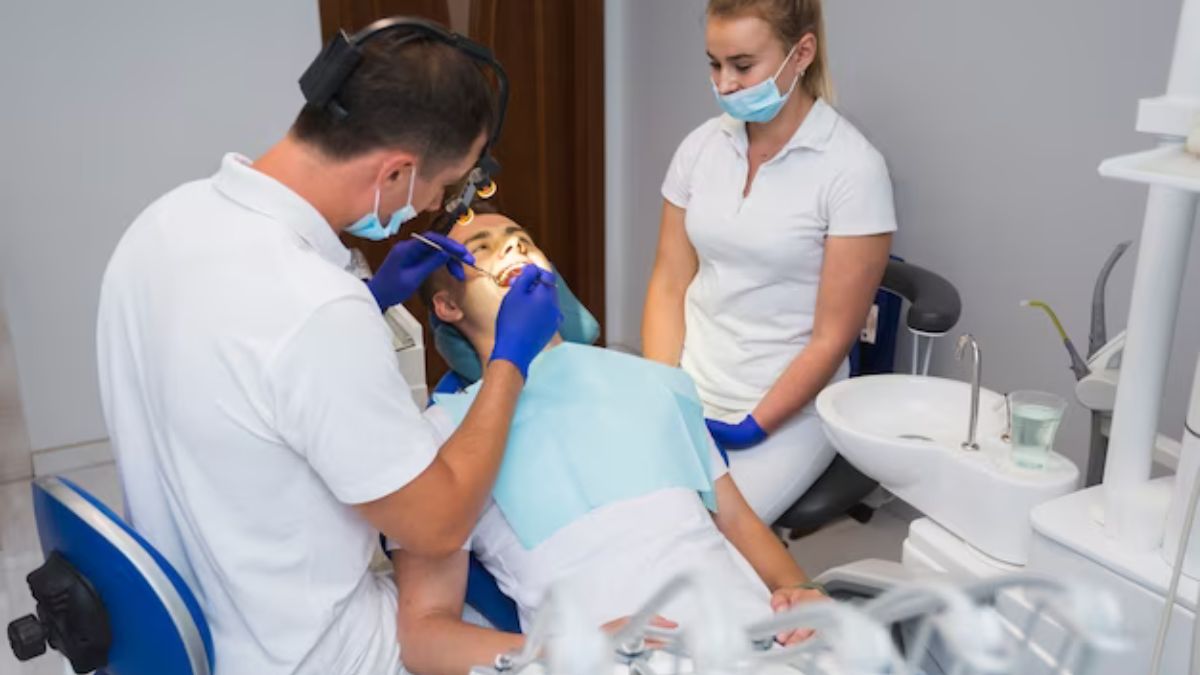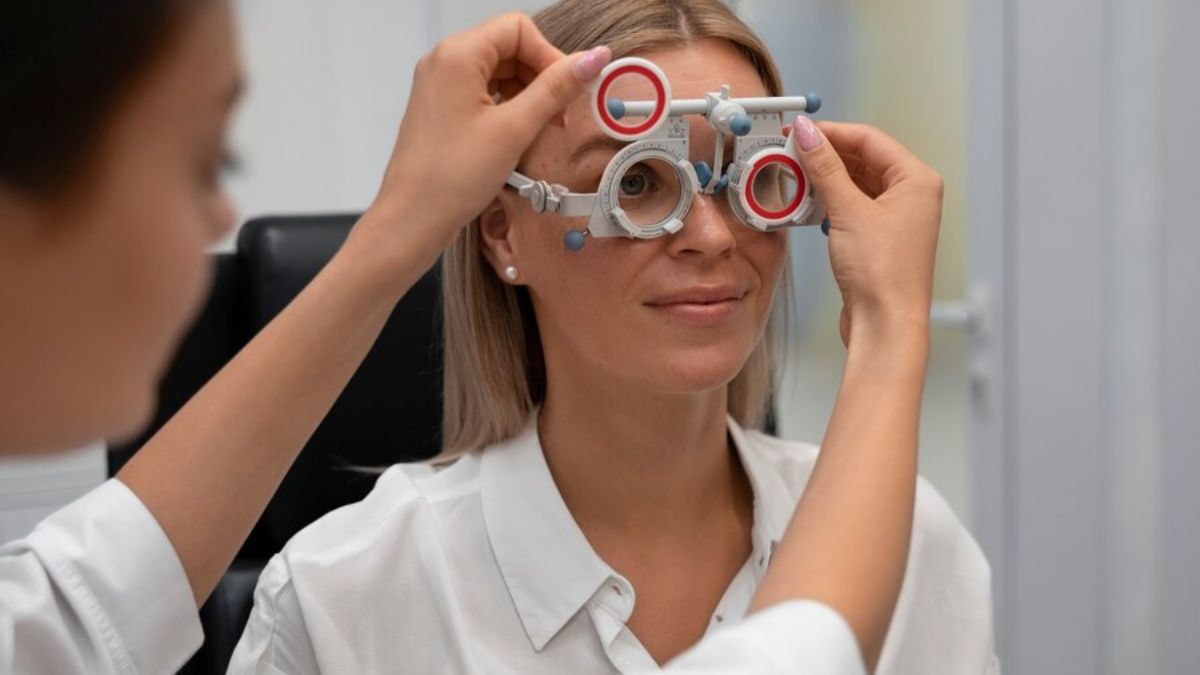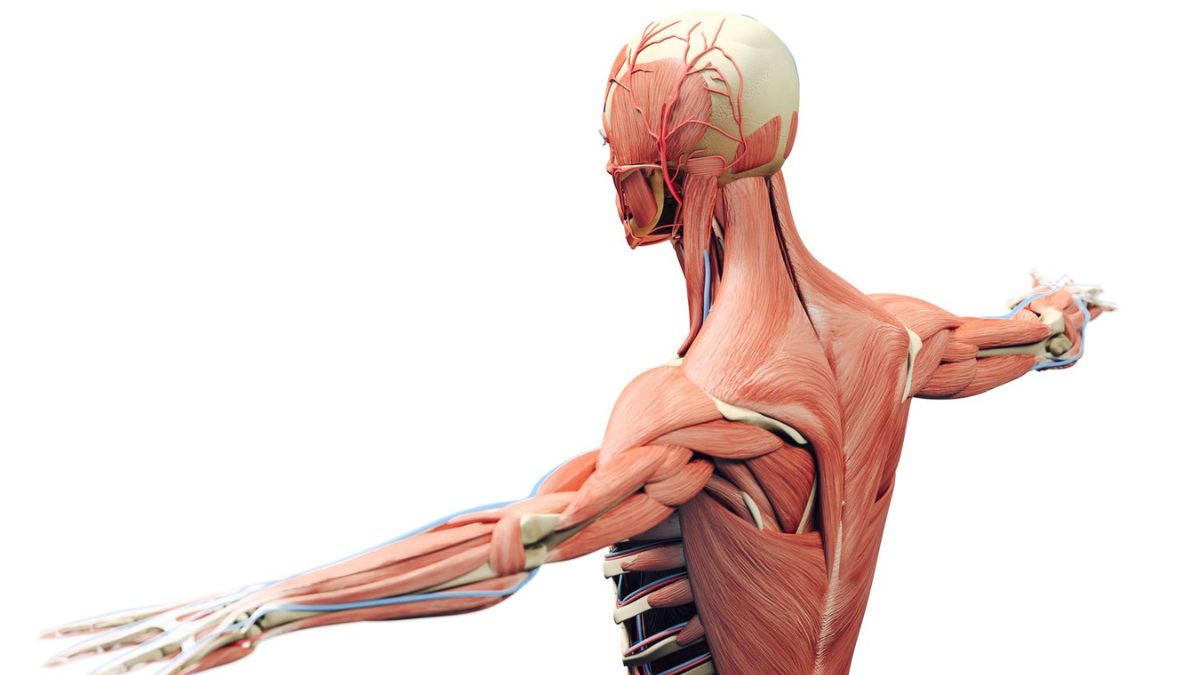HEALTH
Dental Sedation Near Me: A Guide to Safe and Stress-Free Dental Procedures

Anxiety and panic are frequent reactions to dental operations for many people. However, dental sedation is available to assist alleviate these worries. This article will serve as an in-depth guide to the topic of dental sedation, covering everything from its uses and advantages to the location of the nearest “dental sedation near me.” Get ready to say farewell to dental fear and welcome to a soothing, pain-free visit to the dentist.
What is Dental Sedation?
Sedation dentistry is the practice of administering medicine to dental patients so that they can rest comfortably during treatments. Those who are anxious or scared at the dentist’s office might benefit greatly from this method. Depending on the demands of the patient and the extent of the treatment, dental sedation can take on a variety of forms, from light relaxation to profound sedation.
The Types of Dental Sedation
Dental sedation comes in a variety of forms to accommodate patients with varying degrees of fear and pain during procedures.
The Types of Dental Sedation
The person receiving treatment breathes in nitrous oxide (laughing gas) through an oxygen tank put over their nose. As a result of the feelings of excitement and tranquility it produces, it should be considered for those with a moderate amount of stress.
Oral Sedation
Oral sedation requires the patient to take medicine orally before the procedure. It’s a nice middle ground between full consciousness and complete relaxation. Those who suffer from minor dental anxiety might choose this alternative.
IV Sedation
Sedation of a deeper kind is provided through intravenous (IV) sedation, which is administered directly into a vein. The fact that patients seldom remember the operation makes it a good option for people who suffer from extreme anxiety or who need extensive dental work done.
General Anesthesia
The use of general anesthesia ensures that the patient will remain asleep during the operation. It is usually reserved for individuals with serious dental fears or for those undergoing difficult surgical procedures.
Benefits of Dental Sedation
Anxiety Relief
Sedation dentistry is used to assist anxious individuals relax enough to get the dental care they need.
Pain Management
When a patient is sedated, they are more at ease and less likely to experience any pain from the surgery.
Time Efficiency
Dental sedation helps dentists get through extensive operations faster and in fewer appointments.
Enhanced Treatment Quality
Increased Quality of Care When patients are sedated, dentists are able to conduct intricate procedures with more precision and accuracy.
Finding Dental Sedation Near You
Consult Your Dentist
Conversation with your regular dentist ought to serve as the first step in discovering dental sedation in the neighborhood. They will additionally be able to tell you what kinds of sedation they use to determine whether it can be effective for you.
Online Search
Searching online for “dental sedation near me” will also yield results relevant to your location. Your search results will include local dental offices and experts who provide sedation options.
Ask for Recommendations
Get referrals from people you know who have had successful dental sedation experiences in your region.
Is Dental Sedation Safe?
When performed by qualified medical personnel, dental sedation is typically safe. However, it is essential to share your entire medical history with your dentist and to adhere to their post- and pre-sedation care instructions.
Conclusion
Sedation dentistry has made many people’s visits to the dentist, formerly a cause of worry, into a relaxing and pleasant experience. Your search for “dental sedation near me” might help you relax and feel at ease throughout any dental operation, from a routine cleaning to a more involved surgery.
FAQs
- Is dental sedation suitable for children?
- A pediatric dentist with experience in sedation dentistry for children should be consulted before using dental sedation on a child.
- Will I be completely unconscious during IV sedation?
- With intravenous sedation, you’ll feel quite relaxed and calm, but you’ll still probably be awake and able to follow basic instructions.
- Are there any side effects of dental sedation?
- Sleep deprivation and short-term memory loss are among the most common side effects. Following the surgery is over, these negative outcomes will cease to exist.
- Can I eat before my dental sedation appointment?
- Before your sedation dentistry session, your dentist will give you detailed instructions on the amount of time you need to fast. If you value your safety, you have to conform to these rules.
- How long does it take for the effects of dental sedation to wear off?
- How long it lasts is dependent on the kind of sedative that was administered. While the effects of nitrous gas wear off fast, those of intravenous sedation may linger for many hours.
HEALTH
Exploring the Benefits of Eye-Ta: A Comprehensive Guide

Are you looking to see the world with crystal-clear vision? Dive into the realm of Eye-Ta, a natural solution that has been revered for centuries. Join us on a journey to explore the wonders and benefits of Eye-Ta, a holistic approach to enhancing not just your eyesight but also your mental clarity. Let’s unravel the secrets behind this ancient remedy and discover how it can transform your daily life for the better.
Understanding the Benefits of Eye-Ta for Vision Health
Have you heard about the ancient practice of Eye-Ta and its remarkable benefits for vision health? This traditional technique focuses on exercises and movements specifically designed to strengthen eye muscles, improve focus, and enhance overall visual acuity. By incorporating Eye_Ta into your daily routine, you can potentially reduce eye strain from prolonged screen time or reading.
One of the key advantages of practicing Eye_Ta is its ability to alleviate symptoms of digital eye strain caused by excessive use of electronic devices. These simple yet effective exercises can help relax tired eyes, prevent dryness, and promote better circulation in the eye area.
Moreover, regular practice of Eye_Ta has been linked to improved concentration and mental clarity. As our eyes are closely connected to our brain function, enhancing visual health through Eye-Ta exercises may also support cognitive performance and productivity in daily tasks.
Whether you’re looking to maintain healthy vision or seeking relief from digital eye strain, exploring the benefits of Eye-Ta for vision health could be a transformative addition to your wellness routine.
The Connection Between Eye-Ta and Mental Clarity
Have you ever wondered about the link between your vision health and mental clarity? Eye-Ta, a traditional holistic practice, is believed to not only benefit your eyes but also enhance your cognitive function. The eyes are often referred to as the windows to the soul, but they also play a crucial role in how we perceive and process information.
By incorporating Eye_Ta into your daily routine, you may experience improved focus and concentration. Clear vision can lead to sharper cognitive abilities, allowing you to think more clearly and efficiently. When our eyes are strained or fatigued, it can impact our overall mental well-being.
Research suggests that maintaining healthy vision through practices like Eye_Ta can positively influence brain function. Just as physical exercise benefits both body and mind, taking care of our eye health can contribute to enhanced mental clarity. Consider exploring the connection between Eye-Ta and mental acuity for a holistic approach toward optimal well-being.
Incorporating Eye-Ta into Your Daily Routine
Are you looking to enhance your vision health and mental clarity naturally? Consider incorporating Eye-Ta into your daily routine. Start by introducing a few drops of Eye_Ta into your morning routine, whether in your morning tea or water. The subtle earthy taste blends seamlessly with beverages.
Try adding a drop of Eye-Ta on the inside of your wrist for quick absorption throughout the day. This simple act can help maintain focus and visual acuity during work or study sessions. Carrying a small bottle of Eye_Ta in your bag allows for easy access whenever needed.
Incorporating Eye_Ta into meditation practices can also amplify its benefits for mental clarity. A few deep breaths infused with the aroma of Eye_Ta can create a calming effect, aiding in relaxation and concentration. Experimenting with different ways to include Eye-Ta in your daily rituals can lead to noticeable improvements in overall well-being over time.
Exploring Other Uses of Eye-Ta Beyond Vision Health
Eye-Ta, a powerful herb known for its benefits to vision health, offers more than just improved eyesight. Beyond its primary function in supporting eye health, Eye_Ta has been recognized for its potential to promote overall well-being.
In traditional medicine practices, Eye-Ta has been used not only for vision-related issues but also as a remedy for digestive problems and respiratory concerns. Its natural properties are believed to help with inflammation and support immune system functions.
Moreover, some studies suggest that Eye_Ta might have calming effects on the mind and body, potentially aiding in reducing stress levels and promoting mental clarity. This dual-action benefit makes Eye_Ta a versatile herb worth exploring beyond its initial association with eye health.
Whether consumed as part of a daily supplement routine or brewed into teas, the diverse applications of Eye-Ta showcase its versatility in supporting various aspects of health and wellness.
Potential Side Effects and Precautions
When exploring the benefits of Eye-Ta, it’s essential to also consider potential side effects and precautions. While Eye_Ta is generally safe for most people, like any supplement or health product, there are a few things to keep in mind.
Some individuals may experience mild digestive issues like bloating or gas when first incorporating Eye_Ta into their routine. It’s recommended to start with a lower dosage and gradually increase to allow your body to adjust.
As with any new supplement, it’s always wise to consult with a healthcare professional before adding Eye_Ta to your daily regimen, especially if you have existing medical conditions or are pregnant or nursing.
It’s important not to exceed the recommended dosage of Eye_Ta as this could lead to adverse effects. Always follow the instructions provided on the packaging and listen to your body’s response.
By being aware of these potential side effects and taking necessary precautions, you can enjoy the benefits of Eye-Ta safely and effectively.
Conclusion
Considering the numerous benefits Eye-Ta offers for vision health, mental clarity, and overall well-being, it is worth trying. Incorporating this ancient practice into your daily routine can potentially enhance your quality of life in various ways. Remember to start with small steps and observe how Eye_Ta positively impacts your physical and mental health over time. Embrace the power of Eye-Ta and experience its transformative effects on your holistic well-being.
HEALTH
Setriasona: Unique Pharma Insights

Setriasona has made a name for itself in the cutting-edge pharmaceutical industry by offering ground-breaking remedies for a range of medical issues. This article will examine Setriasona in great detail, including its definition, characteristics, advantages, and distinctive qualities that make it stand out from competitors.
What is Setriasona?
A medication called sestriasona is well-known for its many uses in the medical industry. Originating from state-of-the-art research, it has attracted notice due to its unique qualities and possible influence on health and overall well-being.
Key Features of Setriasona
The versatility of Setriasona is one of its best qualities. In contrast to conventional drugs, Setriasona uses a multimodal strategy to treat a range of medical conditions. Its distinct composition and formulation add to its effectiveness, which puts it at the forefront of the pharmaceutical industry.
Benefits of Setriasona Usage
Setriasona users claim a variety of advantages, including increased general well-being and cognitive performance. It is a sought-after remedy for people wishing to address a variety of health issues without having to deal with the side effects that are sometimes connected to conventional pharmaceuticals because of their adaptogenic qualities.
4. How Setriasona Works
[Details on the metabolic processes] are the mechanism behind Setriasona. Setriasona stands out from other medications due to its novel methodology, which guarantees desired outcomes while reducing side effects.
Comparing Setriasona with Alternatives
Although there are many competitors on the market, Setriasona is unique due to [certain benefits]. This section aims to offer a thorough comparison so that customers may make well-informed decisions regarding their health.
Setriasona in Medical Research
Setriasona is essential to medical research, and the pharmaceutical industry is undergoing a paradigm change as a result. Its prospective uses in [name particular areas] are being investigated by researchers, perhaps leading to new developments in healthcare.
User Testimonials
Experiences from the real world tell a story. Individuals who have included Setriasona in their daily regimens report more energy, better attention, and a general feeling of well-being. These testimonies give important context for understanding the real-world advantages of Setriasona.
Potential Side Effects
Although most people handle setriasona well, it’s important to be informed of any possible adverse effects. It’s important to speak with a healthcare provider for specific guidance, as typical side effects might include [list common side effects].
Dosage and Administration
It is crucial to follow the advised dose and administration directions for the best outcomes. The recommended dose, recommended administration techniques, and any other user-related issues will all be included in this section.
Setriasona in the Market
The environment of the Setriasona market is changing quickly. Its increasing appeal is a result of industry collaborations, consumer trends, and legislative advancements. Keep checking back as we examine the factors influencing Setriasona’s market share.
Research and Development
Exciting opportunities arise as Setriasona research advances. Aiming to uncover new potentials and improve current formulations, ongoing research promises improvements that have the potential to completely change the pharmaceutical industry.
Conclusion
To sum up, Setriasona is a promising development in the pharmaceutical industry. It is positioned as a significant option for individuals looking for healthcare alternatives because of its distinctive features, pleasant user experiences, and continuous research.
FAQs
Is Setriasona safe for long-term use?
Although typically well tolerated, for tailored guidance on long-term use, it is best to speak with a healthcare provider.
Can Setriasona be taken with other medications?
To avoid possible drug interactions, always speak with a healthcare professional before using Setriasona with other prescriptions.
Are there age restrictions for Setriasona use?
Adults using setriasona are generally safe, yet there may be certain age-related restrictions. Speak with a medical expert for direction.
How quickly can one expect to see results with Setriasona?
The outcomes might differ, thus it’s important to allow Setriasona enough time to show its effects. Individual reactions vary depending on lifestyle and health conditions.
Where can Setriasona be purchased?
Online merchants or authorized stores may carry Setriasona. Make sure the sources from which you are buying are reliable.
HEALTH
Unlocking Your Well-being: A Dive into 10desires.org Health

In the modern world, people of all ages have chosen to make it their top priority to take care of their health and well-being. The landscape of healthcare and health services remains constantly changing, so individuals must remain up-to-date and make use of tailored online resources. In this post, we’ll take a look at every possible manner in which 10desires.org Health might help you improve your health. Prepare to go off on a path that promotes better healthcare.
Navigating the 10desires.org Health Portal
What Is 10desires.org Health?
10desires.org Health is built on a robust platform that aims to improve people’s health in all areas. If you have any questions or need any services about your health, go no further than our online hub.
The 10 Pillars of Wellness
Find out what 10desires.org Health prioritizes to improve your health as a whole. Each pillar, which ranges from diet and exercise to mental health and preventative treatment, is intended to give you more control over your health.
Personalized Health Assessments
Learn about the value of personalized health evaluations that can shed light on your specific health situation. 10desires.org Health tailors its advice and assistance to each individual by taking into account their unique wants and requirements.
Health and Lifestyle Blogs
Expert-Authored Articles
Check out this wealth of articles written by experts in the field of health care. Various health-related subjects are explored here, with helpful insights, suggestions, and guidance provided.
User-Generated Content
Participate in the conversation by reading testimonials from people whose lives have been improved because of the resources provided by 10desires.org Health. Find others with similar health goals and connect with them.
Interactive Health Tools
Fitness Tracker
Use a smart fitness tracker to monitor your development as an exerciser. Get in shape by planning your strategy, keeping track of your progress, and maintaining your enthusiasm.
Meal Planner
Use the meal planner to organize your meals with pinpoint accuracy. Get meal plans tailored to your tastes and health objectives.
10desires.org Health Membership
Premium Benefits
Learn about the exclusive benefits that members of 10desires.org Health enjoy. Benefits for members range from preferential scheduling with doctors to price reductions on health and fitness supplies.
Community Support
Come together with others who value health and wellness as much as you do and find mutual support. Engage with people, get their input on your health journey, and be an inspiration to others.
Conclusion
To live a better and happier life, 10desires.org Health is more than simply a website. This platform gives you the tools, knowledge, and community you need to improve your health on your terms. Use 10desires.orgHealth as the starting point for your path to a better self.
FAQ’s
Is 10desires.org Health suitable for all age groups?
Absolutely! 10desires.orgHealth serves people of all ages by providing them with individualized information and assistance.
Are the personalized health assessments accurate?
The goal of individualized health evaluations is to give you reliable information about your health status so you may make educated decisions.
How can I contribute my own health story to the platform?
Creating a user account and presenting your health journey using the given channels on 10desires.org Health is a simple way to help others.
What benefits can I expect as a premium member?
Access to medical professionals, exclusive offers, and higher membership status are just some of the perks enjoyed by premium members.
Is 10desires.orgHealth accessible on mobile devices?
Keeping in touch and up-to-date when on the road is a breeze thanks to the mobile-friendly design of 10desires. or health.
-

 TECH8 months ago
TECH8 months agoExploring the Exciting Features of PHP Version 8.1 for Enhanced Web Development
-

 CRYPTO4 months ago
CRYPTO4 months agoUnlocking the Potential: Understanding WalletConnect là gì
-

 NEWS5 months ago
NEWS5 months agoBestadvise4u.com News: Your Gateway to Informed Living
-

 ENTERTAINMENT5 months ago
ENTERTAINMENT5 months ago“кинокрадко” – Unmasking the Culprit Behind Film Piracy
-

 TECH4 months ago
TECH4 months ago“몽세리 266b+v”: Revolutionizing Technology for a Better Future
-

 HEALTH6 months ago
HEALTH6 months agoTough Tissue Muscle Connector: The Unsung Heroes of Movement
-

 WINDOWS11 years ago
WINDOWS11 years ago(solved)-Windows update cannot currently check for updates, because the service is not running. You may need to restart your computer
-

 WINDOWS9 years ago
WINDOWS9 years ago(Solved) – “How do you want to open this type of file (.js)?” Windows 8/8.1
